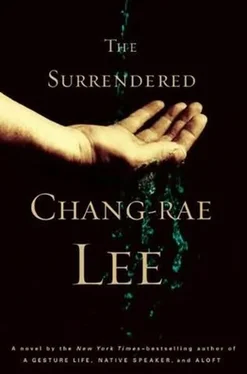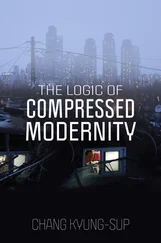“A way to what?”
“To being with her always. Isn’t that what you wanted, too?”
He didn’t answer, because of course it was true. Yet at the time he didn’t quite know it-he was too brutal and stupid, just a rig of flesh that selfishly craved and rebelled. He didn’t understand then how deeply he needed her, that he loved not just her sharp wants and carnality but how tightly bound up those were with her decency and beauty and goodness; she was exalted and flawed, someone who required as much grace and succor as she herself readily offered, someone both he and June desperately needed, a mother and a lover and a kind of child, too. That first time they made love, when she opened the back door of the cottage for him, she had fallen upon him as if she’d thrown herself from a parapet, with the grave force of both will and surrender. She kissed him, bit him, wanted his fingers inside every part of her. She was more than thirty years gone now, though it could be a mere day, and he felt his heart suddenly unstitch, the wire twine instantly rusting, falling away, to reveal again the cold box, the great dark underworld of his guilt.
“I’m so tired,” June said. She had a hand on her belly, not quite holding it, the way a pregnant woman might unconsciously take her own measure. She lay back down and slowly closed her eyes. With a long swig Hector finished the first bottle, its liquor still burning his throat. He had just opened the other bottle when she said, “I’ll sleep a little now.”
“Okay.”
“Aren’t you going to eat?”
“No,” he said. He was already drinking deeply again, a broad, dry delta. “Maybe later.”
“Will you stay here with me?”
“Where else would I go?”
“Just stay.”
He nodded to her and waited until her breathing grew steady and more audible. He had become her sitter now. Like a child, she was acting as if his remaining within the scope of her reach and sight would somehow diminish his power or will to leave. And yet now her insistence seemed strangely valid, for he thought he needed to step outside the cottage to determine what he would do. In fact, in Livorno he had, at least temporarily, deserted her; for two hours he sat in the main station, waiting for the next train to Rome, until he finally returned to their room at the hotel and found her unable to get out of the tub. She’d been showering and had reached up to adjust the sprayer and lost her balance, slipping and falling hard on her side and back. Though she was in pain, nothing, miraculously, was broken-a folded towel on the tub edge had softened the impact-and the distress of the situation allowed them to avoid the question of where he had been. Her nakedness was unsettling, but only to Hector; she didn’t try at all to cover herself, either immediately or after he lifted her up, merely sitting on the bidet in a miserable daze. Her breasts were shrunken and lined and her scarred belly was partly distended to a shine, and the patch of hair between her legs, a thick, dark broom, was the sole indication that she was not even fifty years old. He had offered her the towel but she only held it in her hands, weakly wringing it, dabbing it against her face as if it were a precious furl of cloth.
The sun was now low in the sky but still bright and he shut the door of the cottage behind him to keep the light from disturbing her. He was sitting on the creaky bench and drinking from the second bottle, feeling the day’s heat radiating from the stone walls behind him. This bottle seemed even stronger than the first, and he was reminded of how Dora began her evenings by downing three small glasses of her own brand in quick succession, as if to prime her needy motor before the drinking proper. So he took three swift shots in somber deference to her, and then three more, not caring that it was harsh on the tongue and throat and smelling of petrol; but the rite fell short, for he conjured up not Dora’s thirst sated, that first sip’s glee, nor the soft grainy apple-flesh of her bottom, nor the furious grip she’d exert on him during their passions, grappling his shoulders, pulling his hair, but rather the horrid bed of the blood-glazed street, and her pretty leg all in a mess, and her eyes beseeching him, not to save her so much as to explain the backward mercy of the world, why it was taking her just at the moment she had finally stopped wanting it to.
Had the eyes of the Chinese boy soldier made the same petition? And the others he had witnessed die during the war? Why was he to be the angel of ironical death? It was those last few seconds that were most horrifying for Hector; at least the mien of the long-dead he had collected doing graves registration was generally one of distinct unconcern, or perhaps the mildest bemusement, if they had faces left at all. He could take their expressions blackened with rot or dried blood or else blown away, cheekless or jawless or lacking a brow, all countless mutilations, the frightful carnage, but watching a living face fade and pale was to him the most grotesque of turns, the one thing he could no longer bear. The promise of being with June at her end made him want to crawl away, to run, and he knew he would indeed have to leave her, that it was inevitable, that he must desert her before the final hour.
He wandered down the steep, arid hillside with the bottle in his hand, drinking it down as he went. The homemade liquor was coursing through him more hotly than usual, almost painfully; he could feel it drawing out into his extremities, these lines of ants on the march. He was going to drink some more, maybe drink the rest. If it was poison, let it be. He found a deer path through the scraggly brush but instead of stepping mindfully he let the pitch take him and he dropped himself headlong in its leafy track, pumping his legs in a velocity of desperate escape; to view him from above was to see, paradoxically, a man running as fast as he could in order to keep from falling.
But even Hector could not sustain the necessary speed, create enough balancing momentum, and he flew down the hill, tumbling head over knee so violently that it appeared he was there to thrash clear the greenery, the rocks, the dusty earth itself. He came to rest in a dark glade of cork trees, their sinuous trunks stripped of bark to the height of eight feet. They were old trees but now naked and smooth, and he felt as exposed as they. He was cut and bruised about the face and knuckles; he was crying, but not from any physical distress. The bottle, emptied, was still in his hand. He’d just missed an exposed sharp spine of rock and he cursed his luck and smashed the bottle against it. He was going to fight himself, pugilist as onanist, because there was nobody else to fight, nobody left to take on. Here he is, your undying low-life champion. With the jagged neck of the bottle he slashed across each wrist and also his neck, and jabbed at his side and thighs. Then he got on his feet and bull-rushed the largest tree. He rammed it with his chest, and then his shoulder, and as he grew weary he pushed against it with his now bloody carmine hands, his carmine-stained forehead, grunting and pumping his legs as if he were a football lineman toiling against a practice sled.
After a stretch of time long enough to be embarrassing, even to a man alone, he relented, his punctures already congealed and crusting over in the unnatural manner they always did. This was the only pain he actually felt, which actually registered, the sear of the too-swift healing. His exhaustion was fed less by exertion than frustration, the closed loop of his thwarted rage, and he fell against the roots and lay staring up at the stilled canopy, the sky dimming to indigo behind the web of gnarled black limbs. The sight was vaguely Eastern in aspect, like a beautiful silk-screened panel, but then lovely for nothing, and he thought that this was the diseased tableau of his life: forever there to witness splendor, while death coolly drifted upon everything else. Up the hill only the chimney of the cottage loomed. If she cried out, if she called for him, would he stay silent? And if she didn’t see the morning, would he simply leave her in the bed for the huntsman to find, or else bury her, as he had buried so many others, dig the necessary hole, his best dark talent among all his dark talents?
Читать дальше











